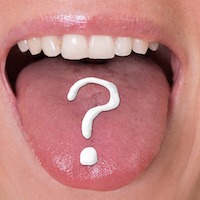Xerostomia? What it is and Why You Should Care
May 14th, 2019
Ever wake up in the middle of the night feeling parched?
Sometimes that dry mouth feeling means that your salivary glands (one of our body’s defense mechanisms) aren’t producing sufficient saliva to keep your mouth moist. As a result, foods, especially carbs, that normally might be washed away, can linger on your teeth too long. Unless you’re brushing continually throughout the day, your chances of developing cavities and even gum disease can increase.
Dry mouth, also known as xerostomia, is often a side effect of certain medications that treat depression, hypertension, heart disease, anxiety, asthma and many other medical conditions. The medical diagnosis for this is also called medication-induced xerostomia, or MIX). It can also be caused by smoking and hormonal changes during menopause. While a common issue and not a disease, xerostomia can definitely have a negative impact on your teeth.
Treatment may include steps as simple as trying to breathe through your nose and not your mouth, and placing a humidifier near your bed. Other possible mouth-moisturizing solutions:
• Chew sugarless gum or suck on sugarless candy (look for xylitol as the sugar substitute)
• Stay hydrated by sipping water throughout the day
• Cut back on alcohol, tobacco and caffeine
• Use non-alcohol oral rinses like CloSys™
• Most importantly: brush, floss, clean your tongue and get regular dental checkups and cleanings with bite-wing digital x-rays when recommended.
Dry mouth can be more than just an annoyance that causes bad breath. Be sure to ask Dr. Levine or Dr. Fava for more tips on staying on top of this annoying but possibly problematic condition. We diagnose MIX multiple times a day as most of our adult patients are on at least one oral medication that can contribute to MIX.
